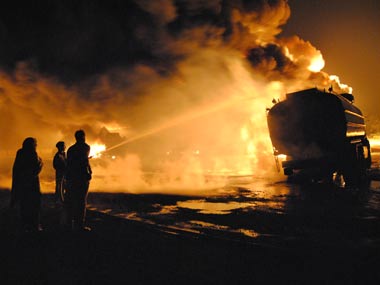With relations between the US and Pakistan still fraught , the US is seeking to shift its fuel, food, and equipment supply routes to the war in Afghanistan away from Pakistan, the Washington Post reported late Saturday. Pentagon officials are concerned that these routes could be “endangered by the deterioration of US-Pakistan relations, partly fed by illwill from the cross-border raid that killed Osama bin Laden,” according to the report. The move appears precautionary, and Pakistan has not officially threatened to cut off access to these supply lines. But relations between the two countries have deteriorated since the US military attack on bin Laden’s Abbottabad compound in May. [caption id=“attachment_35883” align=“alignleft” width=“380” caption=“Repeated attacks on NATO supply trucks, such as this one in Pakistani territory, have prompted US officials to look to alternative routes to get supplies into Afghanistan. Reuters”]  [/caption] On Wednesday, for example, Pakistan asked the US to leave the Shamsi Airbase in the southwestern Baluchistan province, the launch site for some of the CIA drone attacks against militants in Pakistan and Afghanistan. And although Pakistan’s defence minister said on Friday that US forces are no longer operating from the base, American officials have said otherwise. Two options The Pakistan route has been crucial to the flow of US and NATO supplies to Afghanistan since 2001. As late as 2009, the US military moved 90% of its cargo by ship to the Karachi port, before the supplies wended their way along mountain passes and deserts into Afghanistan. Around 60% of NATO supplies pass through Pakistan from the Karachi port, mainly through the Khyber Pass. Meanwhile, nearly 40% of US cargo is delivered to Afghanistan by hop-scotching through Central Asian via train and truck that the Pentagon has dubbed the Northern Distribution Network. Military officials said that in an effort to reduce reliance on the Pakistani route, the US is growing its capacity on the northern pass to 75% by the end of 2011. “It’s either Central Asia or Pakistan — those are the two choices,“a US defence official told the Washington Post. “We’d like to have both. We’d like to have a balance between them, and not be dependent on either one, but always have the possibility of switching.” The downsides Although the northern route into Afghanistan provides the US with increased flexibility, it also bumps up military costs and further enmeshes the US government with authoritarian countries in Central Asia. More specifically, the non-Pakistan path involves extended collaboration with countries like Uzbekistan, which has come under fire by human rights groups and which has prompted criticism that the Obama administration is partnering up with dictators (according to the US Department of State, more than one-third of the northern route snakes through countries besieged by “ pervasive corruption”). And there are serious limitations to the northern route: Only food, supplies, and construction materials are allowed; ammunition and “lethal” material are strictly forbidden. Furthermore, the Central Asia pathway only allows for supplies moving into Afghanistan, but not out. With President Barack Obama announcing his plan to draw down troops in Afghanistan by the end of 2012, there are attempts to renegotiate these terms. The US also approached China about developing another route for NATO supplies through Chinese territory, but was rebuffed. US-Pak: A ‘complicated relationship’ Even as it looks to reduce its dependence on access to Pakistan, the US sought to provide reassurances that the South Asian nation remains a “very important” partner to the US in counterterrorism. “The Pakistanis and the United States have a complicated relationship,” US National Security Advisor Tom Donilon told CNN on Saturday. “And there are going to be frustrations and disagreements. We remain engaged with Pakistan for a number of very important reasons related to our national security, and I think, ultimately their security.” He continued: “They (Pakistanis) are a very important counterterrorism partners for the United States. The Pakistanis have lost thousands of military and civilians to the extremists. More extremist groups and individuals have been attacked and taken down in Pakistan than any place outside in the world.”
With Pakistan-US relations on an unstable footing, the Obama administration turns to Central Asia to keep food, supplies, and construction materials flowing to Afghanistan.
Advertisement
End of Article


)
)
)
)
)
)
)
)
)



